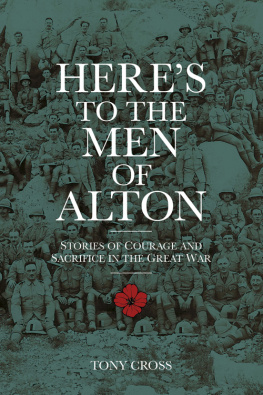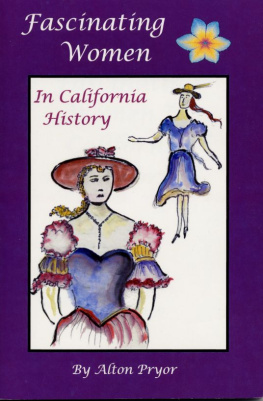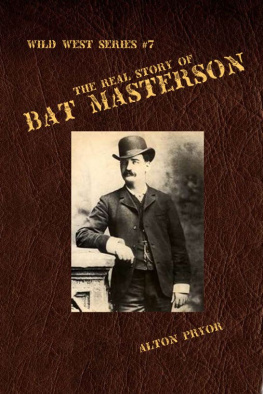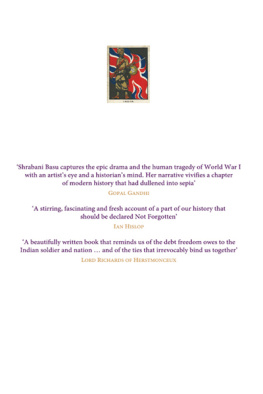

Dulce et decorum est pro patria mori
It is sweet and fitting to die for your country
Horace (65 BC BC )
Men of Alton
Heres to the men of Alton!
Who gave their lives to gain,
Fresh honours for their Country
And the old flag to retain.
Then forward, men of Alton!
The vacancies to fill
Of those who fell
And fought so well,
For honours they have gained.
Its all for righteous causes
That we are in the fray
To crush the Huns,
Destroy their guns,
And make the Kaiser pay.
Pte H. Gilliam
RAMC with the BEF
Hampshire Herald & Alton Gazette , 16 January 1915
C ONTENTS
Men of Alton Who Died During the Great War |
How the Army was Organised |
My interest in the men of Alton who lost their lives in both world wars began in the autumn of 2000 when I was asked to talk to a local Cub Scout group, in which my son was a member, before they paraded at the Remembrance Day commemoration. I had previously written an article on the towns war memorial but realised I knew little about the men whose names were recorded on it.
The local community bore witness to the sacrifice of many of their young men during both major conflicts of the twentieth century. However, with the passing of the years, an awareness of this sacrifice has gradually been lost. As curator of Altons Curtis Museum, itself part of the war memorial, I felt it was a task I should undertake to ensure that the men who had died were not forgotten. Appeals in the local press resulted in contact with resident families who had lost relatives and much relevant material came to light. Over time, more details were discovered and those about whom nothing was known were gradually reduced. Following my departure from the museum in 2011 , I continued this research so that their sacrifice would be recognised by the local community a century later.
Numerous people have contributed a considerable amount of work and time in following the hundreds of leads from a wide variety of sources and I give my thanks for their valuable assistance, particularly to Jane Hurst. I am also grateful to Ruth Boyes at The History Press for her editorial input. Any errors contained here are entirely my own.
The result is a collection of information relating to those young men who were lost in the Great War, including in which unit they served, where and when they died, and where they are buried or remembered. Visits to the battlefields are nothing new; indeed they began while the war was still being fought. However, I would like to think that todays Altonians taking Continental holidays might locate cemeteries, mainly in Belgium and France, that contain the last resting place of those local men who went off to fight for King and Country fully expecting to return to the pleasant market town that, a century later, we are also pleased to call home.
Tony Cross
2015
Sources of Illustrations
Author:
Commonwealth War Graves Commission:
Hampshire Cultural Trust:
Royal Naval Museum:
Royal Hampshire Regiment Museum:
Forces Postal History Society:
Private collections:
On Sunday, June 1914 , the Austro-Hungarian Archduke Franz Ferdinand and his wife Countess Sophie were shot and killed in Sarajevo, the capital of Bosnia-Herzegovina, then part of the Austro-Hungarian Empire. It was their fourteenth wedding anniversary.
The Austro-Hungarian Government believed that the Serbian Government had been involved in the assassination, so Austria-Hungary declared war on Serbia exactly one month later. Serbias ally, Russia, began preparing for war against Austro-Hungary. Austria-Hungarys ally, Germany, declared war on the Russian Empire on August 1914 , and Russias ally, France, declared war on the German Empire on August 1914 . The German Army was ready to invade France by marching through Belgium, announcing their intention of doing so with or without Belgian permission.
Until now the British Empire had not paid much attention to these events. However, in , several countries, including Great Britain and Prussia (as Germany was then called), had signed a treaty promising to respect the independence of Belgium. The British Government therefore threatened war with Germany, unless the German Army retreated from Belgium. When they failed to comply with this demand, the British Empire declared war on Germany on Tuesday, August 1914 .
Hampshire was one of the first English counties to see military activity. The Royal Navy base at Portsmouth had become one of the greatest dockyards in the world. Meanwhile, the British Army had been concentrated at Aldershot, ready to defend the South Coast of England or travel by railway to Southampton, from where they could be carried by troopships for service throughout the British Empire. At Farnborough, the Royal Engineers began experimenting with observation balloons and man-carrying kites activities that led to the formation of the Royal Flying Corps and the Royal Aircraft Factory.
The presence of much of the British Army, Navy and Air Force in Hampshire, meant that those forces were best placed to help on mainland Europe. The British Expeditionary Force (BEF) moved by road and rail to Southampton and landed in France on Friday, August 1914 .
C HAPTER O NE
THE BUILD-UP TO WAR
On Saturday, July 1914 , the death of Archduke Ferdinand the previous Sunday was not headline news in the Hampshire Herald & Alton Gazette ( HH&AG ). Being a local newspaper, there were local stories including the visit of the Lord Mayor of London to the Treloar Cripples Hospital. However, a national item was also featured the death of Joseph Chamberlain, the politician father of Neville Chamberlain who took Britain into the Second World War twenty-five years later.
Next to an advertisement for local ironmonger T.M. Kingdon & Sons, towards the bottom of page , was a small piece headed Austrian Heir Assassinated a double attempted tragedy. Three short paragraphs outlined the event followed by a section on the new heir presumptive, Archduke Charles Francis Joseph, the eldest son of the murdered princes brother, who had died in .
Subsequent editions of the newspaper carried no further information about the diplomatic storm and it was not until July that Altonians had any real idea of the unfolding drama. The report of a visit by King George V to Spithead for a weekend with the fleet, mentioned that the event had been curtailed by the delay caused by the political crisis which prevented him arriving until Saturday evening.
Larger reports related to the North East Hampshire Agricultural Society, the Overton Sheep Fair, the funeral of -year-old Montague Knight of Chawton House and the marriage in New Zealand of Godfrey Burrell, a member of the well-known Alton brewery family. It was also reported that the -mile-long ( km) Panama Canal would be opened to traffic on August.
The edition of August 1914 reported the death of printer Mr C.J. Moody, who lived on Normandy Street, and included details of the Horticultural Society Flower Show held in All Saints vicarage meadow. It was not until page that the developing war was mentioned. An international news report mentioned mobilisations of many countries, including Russia:
Austria and Serbia at War Capture of Belgrade Russias Mobilisation Martial Law in Germany Grave situation throughout Europe.
Next page













